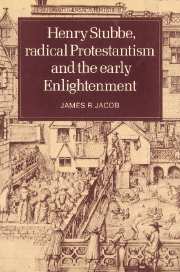Book contents
- Frontmatter
- Contents
- Miscellaneous Frontmatter
- Preface
- Introduction: the historiographical problem
- 1 Hobbesian Independent
- 2 Republican Independent
- 3 Surreptitious naturalism: the invention of a new rhetoric
- 4 ‘Mahometan Christianity’: Stubbe's secular historicism
- 5 Aristotle on the ale-benches
- 6 Court pen: ‘ancient prudence’ and royal policy
- 7 Court to country
- 8 Civil religion and radical politics: Stubbe to Toland
- Epilogue: the paganizing thread
- Notes
- Bibliographical Note
- Index
1 - Hobbesian Independent
Published online by Cambridge University Press: 14 October 2009
- Frontmatter
- Contents
- Miscellaneous Frontmatter
- Preface
- Introduction: the historiographical problem
- 1 Hobbesian Independent
- 2 Republican Independent
- 3 Surreptitious naturalism: the invention of a new rhetoric
- 4 ‘Mahometan Christianity’: Stubbe's secular historicism
- 5 Aristotle on the ale-benches
- 6 Court pen: ‘ancient prudence’ and royal policy
- 7 Court to country
- 8 Civil religion and radical politics: Stubbe to Toland
- Epilogue: the paganizing thread
- Notes
- Bibliographical Note
- Index
Summary
Hobbes had an enormous impact on late seventeenth-century England, and nowhere more than on religion. From the 1650s on through the century Christian apologists took up their pens to answer the Hobbesist threat. If the anti-Hobbesist literature offers any measure of Hobbes's impact, one might be led to conclude that his influence was pervasive, that Hobbesism in religion had spread or was at least in danger of spreading throughout the land. What is remarkable, however, given the degree of anti-Hobbesism, is the fact that so little explicit Hobbesism in religion gets into print or even enters public discourse during the Restoration. Censorship of course would work to keep it out of print, and, since Hobbesian views were so heretical, people who held them were probably reticent to express them in public. If anyone had any doubts on this score, the example of Daniel Scargill would serve to remind him of what lay in store for the avowed Hobbesist. Scargill was a young Cambridge don who in 1668 was brought before University authorities and forced publicly to recant his Hobbesian views. He was never heard from again on any issue.
Seen in this light, Stubbe's case is particularly interesting. Others have noted his association with Hobbes during the 1650s, but no one has shown the character of Hobbes's influence upon him both before and after the Restoration.
- Type
- Chapter
- Information
- Publisher: Cambridge University PressPrint publication year: 1983



